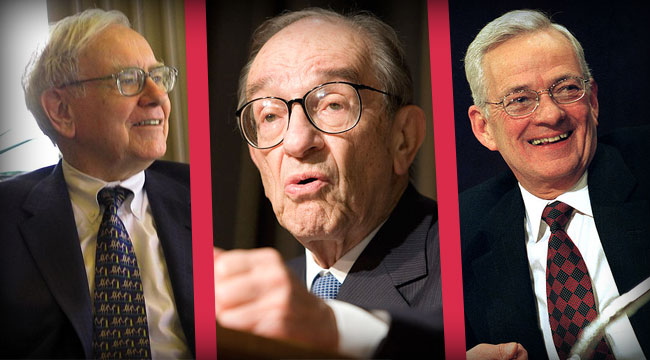Why You’re Reading the Oracle of Omaha
“I honestly think you have gone soft,” begins a reader comment to our new site.
“Specifically: ‘When They Come for Your Guns, You Will Turn Them Over.’ Now you have Warren Buffett speaking soft words with no meaning. I have been reading since 1989… from print to the Web. And now this?”
That, among a litany of comments, mostly negative, was posted to the new “mobile friendly” Daily Reckoning website. We began with this trite response: “Most people don’t like change…” but then we stopped.
Buffett’s essay and, dare we say, perspective, came from a project we launched five years ago… you can file it under the category “What were they thinking?”
Our beat is money. Wealth. Politics. More precisely, the nexus between money, wealth and politics. You may not like what Alan Greenspan or Warren Buffett have to say. But there are a lot of folks in the market and in government who do…
If it pleases you more, we happen to agree with our friend Bill Baker, founder of Gaineswood Capital, who critiqued I.O.U.S.A.… and Buffett… in his book Endless Money:
“The elephant in the room at the I.O.U.S.A. town hall meeting was ‘fiat currency.’ The pleasant and fatherly Warren Buffett assures us that the economic pie always grows, and that if we were from Bangladesh, we would gladly ‘bid’ as if in an auction to pay a high tax rate on income should we be allowed to emigrate, because things are so great at home. Buffett’s highly public backing of higher income tax and death tax rates is analogous to Mark Twain’s Tom Sawyer, who convinces the boys of his neighborhood that whitewashing a fence is not work. Sawyer ‘was a poor poverty-stricken boy in the morning,’ but is ‘literally rolling in wealth’ by the afternoon. And then ‘plans the slaughter of more innocents.’
“Buffett exhorts us to like the inevitable tax increase [to come]. Yet this is the best possible outcome of all for this billionaire because it will maintain the stability of the dollar and it might keep inflation from completely coming uncorked. But still preserve a gentle upward trajectory. It would also avoid the diminution of his wealth through excessive printing of money.
“Importantly, it also ensures the bar tab for the binge we have enjoyed as a country gets picked up by the middle class; as for his own tax liability, that is probably shielded by insurance company tax breaks, offshore legal structures or donations he directs to his or Bill Gates’ foundations. He is no causal Pollyanna, having been buying downtrodden banks and other financial stocks with both hands…”
The federal budget deficit this year, is expected to close below $1 trillion for the first time since 2008… the year we premiered the film. The Associated Press credits “steady economic growth and higher tax revenue.” But only in Washington are two steps back, instead of three, considered “progress.”
As we go to press, May’s numbers have just come in. The federal budget deficit widened in May with a 10% increase in spending over the previous year. The federal government fell $139 billion short of its bills in May alone. Since the 1980s, it’s more or less been the norm:
Only recently have the Feds failed as miserably at math as any fifth grader. Less than six weeks after we premiered I.O.U.S.A. in 2008, Lehman Bros. declared bankruptcy. The chart above tells the story of the bailout and stimulus period in our contemporary history. (Notice too the deficit era and growing federal debt gets underway in 1971.)
Paul O’Neill was fired as treasury secretary by Vice President Dick Cheney. Deficits, O’Neill argued, are a stepping stone to debt. “Reagan proved deficits don’t matter,” came Cheney’s legendary reply.
If deficits don’t matter, one wonders… when does debt? We don’t claim to know the answer — but we suspect it’s leading the U.S. Treasury on the path toward the “mother of all asset bubbles.”
Regards,
Addison Wiggin
for The Daily Reckoning
P.S. True, this week we’ve featured commentary from the likes of both Warren Buffett and Alan Greenspan — both of whom are very public figures that come with their own set of political baggage. But as we mentioned above, our beat is the nexus between money, wealth and politics. And whether or not you agree with them — or any of the figures we feature daily in these pages — there’s no denying their importance.
Of course, if you’re only discovering this commentary on our website, you’re only getting half of the story. Our email edition offers a more comprehensive assessment of all these important topics… and how you can use them to your benefit. If you haven’t already done so, sign up for the Daily Reckoning email — for free — right here.





Comments: